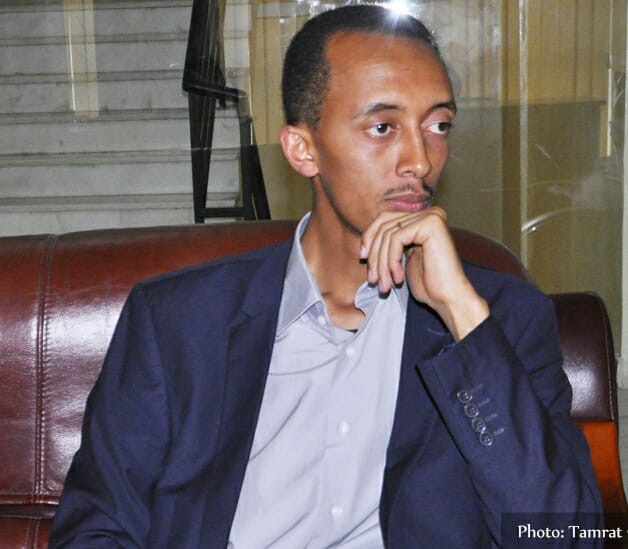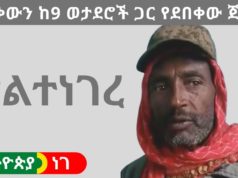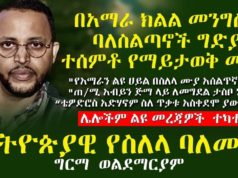Nathenael Feleke Aberra was one of the members of the once banned Zone9 blogging group in Ethiopia. He spent a year-and-a-half in prison, including the infamous Ma’ekelawi for his political beliefs and activism. He has since emerged as a noted political activist in the country. He shares with The Reporter’s Samuel Getachew on his activism, on his experience as a prisoner of conscience, his run-in with one time American Secretary of State, John Kerry and how he envisions the future to be, for Ethiopia and himself. Excerts:
The Reporter: You have been an activist for a while and you are now moving into the role of an active political actor within the country. Tell me about that?
Nathenael F. Aberra: Yes, I was one of the cofounders of Zone 9, a blogging and activist group established in 2012. We used to write critical articles and hold online campaigns on social media platforms that promoted the respect of human and democratic rights and constitutionalism in general. In some ways, my engagement in a political party is a continuation of the role I have been playing as a member of Zone 9, in a different capacity and platform of course.
Like many people in Ethiopia, who are engaged politically, you became a prisoner of conscience. You have said little about that part of your experience. How was it like been imprisoned, not because of crime committed but for your civic engagement?
I imprisoned was for a year and half. Almost three months in the now closed notorious detention center called Ma’ekelawi and the rest in Qilinto Remand Prison. The time I spent in Ma’ekelawi was actually the worst of my life. For much of the time in Ma’ekelawi, we were kept in the building commonly known by the name Siberia. It was an all concrete cold building where we spent all day being locked in a prison cell of less than 20 m2. At times, the number of prisoners in a single cell rose to 14. We were allowed to visit the lavatory twice a day for about 10 minutes each.
The investigation was harsh with; physical and psychological abuses. They didn’t allow family members to visit us for the first three weeks. We were also denied our right to speak to our lawyers for the same period.
We went through all these because we had a different opinion and we asked for our rights, which are clearly stated in the FDRE constitution, be respected. The regime had actually blocked our blog from being accessed in Ethiopia for a handful times early on. But I didn’t think they would seriously consider us as a threat to their grip on power until they decided to put us in jail and charged us with terrorism.
The court hearings at the federal high court went on for well over a year until the judges decide to acquit all of us from the terrorism charges. Dissatisfied with the acquittal, the prosecutor appealed against the high court’s decision to the Supreme Court. The Supreme Court overruled the high court’s decision, I and two of my Zone 9 colleagues were defending incitement charges when the current administration came in and decided to discontinue the case.
This is only one story out of tens of thousands of stories in which citizens had to suffer just because they exercised their constitutional right to free speech or association and so on. It was really unfortunate.
You are now an active member of Patriotic Ginbot 7. What is it that appeals to you the most about them?
I have been working closely with members of Patriotic Ginbot 7 starting from organizing the welcoming ceremony for the leadership of the movement from abroad and onward. I also joined the team that is responsible to mobilize and organize members in Addis Ababa for the upcoming election.
The objectives of Patriotic Ginbot 7 as stated in its mission and vision statements was the main reason I have been following them closely for a long time. The decision it made to form a political party that will engage in the democratization process peacefully and that the party considers citizenship based politics as a main pillar influenced my decision most. The chairperson of the Movement, Berhanu Nega (Prof.), has also been a big influence in my life.
Let’s talk about the new coalition that was announced yesterday and in which Patriotic Ginbot 7 is to become a prominent member of. What are some its vision for the upcoming election?
It is not a coalition per se. All involved political organizations dissolve and their members will together form a new party. The upcoming party will be organized basing constituency woredas. All its members will join the election woreda level structure of their residence and need to be elected democratically to be part of the inaugural party congress or any leadership position thereof.
The draft of the new party’s code of conduct, program and different sector policies are now ready for members’ training and discussion. It will be made public once the congress adopts them. In general, the pillars of the new party are Citizenship Based Politics that ensures all citizens will enjoy equal rights and opportunities anywhere in the country and Social Justice which basically means the program and policies developed focus on how to solve problems of the underprivileged part of our society; which we think is crucial in maintaining and further enhancing our social cohesion.
In reflection of the slew of reforms that have taken place in Ethiopia, what has impressed you most and why?
The most important of the reform was the decision made to open up the political space by freeing political prisoners and invite those that were fighting for freedom to be part of the democratization process. This, I think, is important because mending our political problems needs the engagement of Ethiopians from every corner and opinion
What is your vision for Ethiopia in the next decade?
We will have at least two elections in the coming decade. Ten years from now, I believe Ethiopia will be a country of stable democracy and on a positive trajectory to prosperity.
The most noted image of you was when you asked John Kerry a question. Many were shocked when you were imprisoned after a few weeks. Your letter to him was smuggled and was published in the Guardian. What was the intention of the letter and did you get a reply?
The time between my question to then US Secretary of State John Kerry and my imprisonment is close to a year. I asked him a question relating to the need to revise US foreign policy in light of the growing influence from other countries that might undermine democratization in the developing world.
From Qilinto, I wrote him a letter in which I asked him to be on the right side in the struggle for the right of the oppressed. My intention in writing the letter was to highlight on the human and democratic rights abuses that were happening in Ethiopia and insist for the need of democratic accountability to avert the crisis. I asked him to craft a form of engagement which will encourage democratic accountability.
Secretary Kerry replied to my letter in which he affirmed his belief in the importance of the existence free market of ideas to ensure long term economic support from the US government. He also ensured me in his letter that his government was following our and similar cases closely and that he expressed his concerns on our arrest to Ethiopian authorities during his visit after our arrest.
If you were to advice the young Nathenael of five years ago, knowing what you know now, as an activist and a budding politician. What would it be?
This is a difficult question. May be I would have advised him to take his engagements a bit more seriously and prepare enough for the consequences.

























